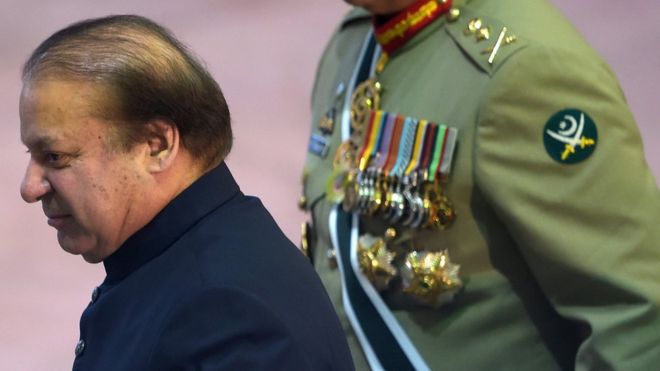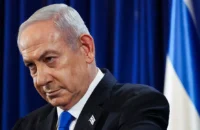By Khaled Ahmed
The Supreme Court of Pakistan has removed Pakistan Prime Minister Nawaz Sharif from office. Sharif is accused of money-laundering in the case relating to the Panama Papers in which he was not named. An inquiry set up by the court under a Joint Investigative Team (JIT) found him guilty of acquiring wealth he couldn’t account for. The case was highly politicised and damaged the credibility of the court in the eyes of a polarised population.
The politicisation was triggered by the agitation of Imran Khan’s Pakistan Tehreek-e-Insaf (PTI), using street power to overthrow Sharif’s Pakistan Muslim League (PMLN) government after charging it with having rigged the 2013 election. The PTI stormed Islamabad in 2014 with the help of the army’s powerful Inter-Services Intelligence (ISI). The move failed after the Supreme Court found that rigging hadn’t taken place. But the nexus, with the army stuck to the PTI, has haunted the judicial process after the international money-laundering scandal broke last year.
The odour of the “nexus” lingers as public opinion grasps the significance of Sharif’s ouster. The media, divided over the judicial process, is coming to terms with the process of accountability most Pakistanis think is missing. But the schism of politicisation remains, casting doubt on the impartiality of the court, especially in an environment of “immunity” granted to “street power” which renders court summons ineffective for the street agitators while the prime minister remains subject to the judicial process. The environment is vitiated further by half a dozen retired army officers who appear on TV channels castigating the prime minister while civilian discussants avoid contradicting them.
Scholars and Pakistan-watchers like Christophe Jaffrelot don’t think corruption is the main reason behind Pakistan’s malfunctioning as a state. The prime minister has been made to step down, for the third time before completing a full term in office, and what will follow may be more of the same: More “accountability” through corrective action taken by the succeeding government if it attains a majority in parliament in the next election. (A coalition will simply compound the ensuing disorder by enabling the army to call all the shots.) What will suffer most will be the economy which is already sending out ominous smoke-signals through the stock exchanges. The most destructive phenomenon in the post-Sharif period will be the vindictive rollback of ongoing projects on the charge of “kickbacks”.
Employing hate-speech, which is the new political idiom, most Pakistanis say the country is doomed because of corruption. But the world outside is sanguine about the $46 billion invested in Pakistan by China — only for infrastructure — which the Pakistanis have come to hate, focusing more on health and education. The world outside, however, didn’t agree. The Economist began the trend of positive assessments in May 2015 noting the kudos the International Monetary Fund (IMF) had heaped on Islamabad for not being lax in macroeconomic discipline. The opposition — the PTI and most erstwhile Sharif allies — dismissed all predictions of better days to come by denouncing the IMF as well.
The Wall Street Journal opened on February 1, 2017 with praise for Pakistan, to the dismay of the honest Pakistani citizen. It noted the rising middle class and gave tidings of poverty-reduction that no one believed. As if by conspiracy, the reputable Bloomberg noted on February 6, 2017 the rise of the Pakistani stock market by 46 per cent, placing it first in the ranking among the world’s stock markets, predicting a 5 per cent growth rate in 2017. It said: “Since 2002, the rate of poverty has fallen by half and over the past three years the rate of terrorist deaths has declined by two-thirds.”
As Pakistanis mourned what they perceived as economic mayhem under Sharif, The Washington Post on February 21, 2017, noted Pakistan “officially” graduating from its “frontier-market” category to the more prestigious — and well-capitalised — “emerging market” index. In fact, Pakistan joined 23 other countries “on the index that represents 10 per cent of world capitalisation”. The conclusion in Pakistan against these assessments: All this has to be a Hindu-Jewish plot against Pakistan!
Jaffrelot doesn’t mention corruption as the cause of trouble in Pakistan. He names the nature of Pakistan’s nationalism or what he calls “nationalism without a nation”, the dominance of the army, conflict between “mild” ideology and “hard Islam”, and the dominance of textbook indoctrination that perpetuates conflict and prevents a rational geostrategic vision that would facilitate attention to the national economy and collection of taxes.
The prospect: There will be more reliance on street power to scare the permanent institutions of the state by the leader who wins a majority in the 2018 election, like Prime Minister Narendra Modi in India and President Erdogan in Turkey, but without the comforting relaxant of high rate of economic growth.




























One Comment